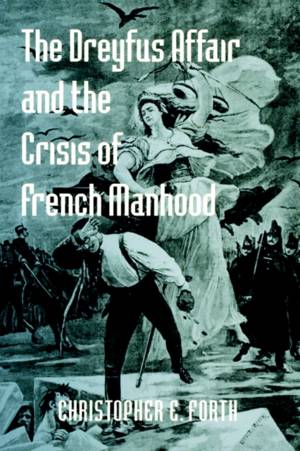
- Retrait gratuit dans votre magasin Club
- 7.000.000 titres dans notre catalogue
- Payer en toute sécurité
- Toujours un magasin près de chez vous
- Retrait gratuit dans votre magasin Club
- 7.000.0000 titres dans notre catalogue
- Payer en toute sécurité
- Toujours un magasin près de chez vous
Description
In 1894, French army captain Alfred Dreyfus, an Alsatian Jew, was wrongly accused of passing military secrets to the Germans. The ensuing scandal has often been studied for what it reveals about French anti-Semitism and tensions between republicanism and conservatism under the Third Republic. But because treason was considered a cowardly--and therefore effeminate--act, Dreyfus also embodied, for many, the danger of effeminate men masquerading in military uniform.
In The Dreyfus Affair and the Crisis of French Manhood historian Christopher E. Forth shows how the rhetoric and images used during the Dreyfus Affair reflected French anxieties about masculinity and modernity, and also facilitated ongoing debates about the state of French manhood through the First World War. Forth first considers the broad gender issues that faced the French at the time of the Dreyfus trial. He examines contemporary newspaper accounts as critiques of the masculine credentials of Jewish men and shows how members of the Jewish press answered allegations of their own cowardice and effeminacy. By situating the figure of the "intellectual" within the gender anxieties of the time, he shows how Dreyfus's supporters defensively tried to affirm their masculinity by distancing themselves from "cowardly" Jews, "hysterical" crowds, and threatening women. This book pays special attention to how the Dreyfus Affair engaged with changing ideals of the male body. Taking as a metaphor the portly body of Dreyfus's most prominent defender, novelist Émile Zola, Forth explores how an emerging emphasis on diet and exercise allowed supporters to celebrate Zola's "heroic" weight loss. Finally, he examines the relation of the Dreyfus Affair to the "culture of force" that marked French society during the prewar years, thus accounting for the rise of the youthful athlete as a more compelling manly ideal than the bookish and sedentary intellectual.
Spécifications
Parties prenantes
- Auteur(s) :
- Editeur:
Contenu
- Nombre de pages :
- 320
- Langue:
- Anglais
- Collection :
- Tome:
- n° 121
Caractéristiques
- EAN:
- 9780801883859
- Date de parution :
- 10-04-06
- Format:
- Livre broché
- Format numérique:
- Trade paperback (VS)
- Dimensions :
- 152 mm x 229 mm
- Poids :
- 462 g

Les avis
Nous publions uniquement les avis qui respectent les conditions requises. Consultez nos conditions pour les avis.






